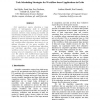Free Online Productivity Tools
i2Speak
i2Symbol
i2OCR
iTex2Img
iWeb2Print
iWeb2Shot
i2Type
iPdf2Split
iPdf2Merge
i2Bopomofo
i2Arabic
i2Style
i2Image
i2PDF
iLatex2Rtf
Sci2ools
109
click to vote
CCGRID
2005
IEEE
2005
IEEE
Task scheduling strategies for workflow-based applications in grids
Grid applications require allocating a large number of heterogeneous tasks to distributed resources. A good allocation is critical for efficient execution. However, many existing grid toolkits use matchmaking strategies that do not consider overall efficiency for the set of tasks to be run. We identify two families of resource allocation algorithms: task-based algorithms, that greedily allocate tasks to resources, and workflow-based algorithms, that search for an efficient allocation for the entire workflow. We compare the behavior of workflow-based algorithms and task-based algorithms, using simulations of workflows drawn from a real application and with varying ratios of computation cost to data transfer cost. We observe that workflow-based approaches have a potential to work better for data-intensive applications even when estimates about future tasks are inaccurate.
CCGRID 2005 | Cluster Computing | Resource Allocation Algorithms | Task-based Algorithms | Workflow-based Algorithms |
Related Content
| Added | 24 Jun 2010 |
| Updated | 24 Jun 2010 |
| Type | Conference |
| Year | 2005 |
| Where | CCGRID |
| Authors | James Blythe, S. Jain, Ewa Deelman, Yolanda Gil, Karan Vahi, Anirban Mandal, Ken Kennedy |
Comments (0)

